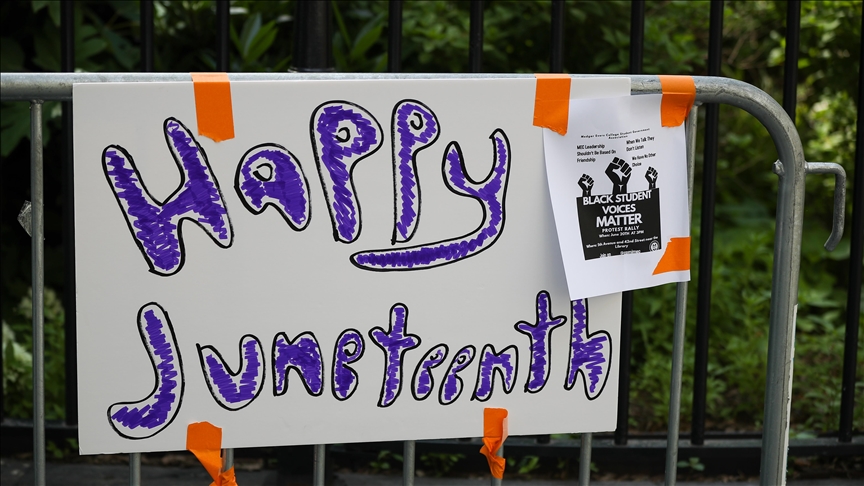End of US slavery: History and significance of Juneteenth
Juneteenth is a reminder for Americans that ‘injustice anywhere is a threat to justice everywhere,’ says professor
 ( Tayfun Coşkun - Anadolu Agency )
( Tayfun Coşkun - Anadolu Agency )
HOUSTON, US
Juneteenth is the day when Americans remember the nearly 250,000 enslaved people in Galveston, Texas who learned they had been freed, but more than two years after President Abraham Lincoln had signed theEmancipation Proclamation abolishing slavery and two months after the US Civil War ended.
“Up until that point, the US was still a slave state because you’re not free until everyone is free,” said Derek Handley, an assistant professor at the University of Wisconsin-Milwaukee and an affiliated faculty with the Departments of African and African Diaspora Studies and Urban Studies.
“It wasn’t until those Blacks in Galveston, Texas found out they were freed that the US truly became a free state. Legally they were free, but the information was being kept from them and they were still being exploited.”
The significance of that day became known as Juneteenth, a word created by putting together the words June and nineteenth.
Even though it was first recognized as a state holiday in Texas in 1980, it was not until 2021 that President Joe Biden signed a law making Juneteenth a federal holiday.
“For a lot of Black people, especially outside of Texas, Juneteenth wasn’t even known,” said Handley.
“When I grew up in Pittsburgh (Pennsylvania), I hadn’t even heard of it or that it happened more than two years after the Emancipation Proclamation was signed.”
Handley stressed that Juneteenth should be recognized to remember the injustices faced by freed slaves.
“The signers of the Declaration of Independence and the US Constitution were slave owners and became rich from owning slaves. We can’t sugarcoat that. Thomas Jefferson created a great document, but he also enslaved human beings,” he said.
"We can carve it up into Black and white, but it’s a part of American history. But what happens to Black people can happen to other people as well.”
Scourge of racism
The abolition of slavery, however, did not end racism in the US, and Handley believes Juneteenth is an occasion on which Americans can acknowledge the racial divide in the country and work toward a more accepting society.
“This is about Americans and making it better for everyone, not just Black Americans,” he said.
“It’s a moment to acknowledge the past as an African American and to understand that on this date all of Black America was technically free, but it’s also a time to reflect on what we can do better, what we need to continue to work on, and what liberties we need to work harder on.”
The way to make America better is to be an active participant in democracy, he emphasized.
“What we can do better in America is having more people paying attention, more people voting, having more local coverage of issues in the Black community and having people talking to each other instead of talking at each other,” said Handley.
“You can’t have a say if you’re not voting, participating, and not making your side heard. Be active in your local government, local school board, be present and participate in the process. You must actively participate in our democracy if you want to make a change and see results."
In recent years, a cultural debate has raged in America over the history of slavery and how it should be taught in schools, as well as the teaching of critical race theory, which states that racial bias is inherent in legal and social institutions on the basis that it was primarily designed and implemented by white people.
In addition, high-profile deaths of Black people over the past several years – including George Floyd, who was killed by white police officer Derek Chauvin who kneeled on his neck for more than nine minutes – has made America more aware of racism and police brutality against Blacks.
Handley said it is important for people to learn lessons from these tragic incidents to improve as a society, adding that Juneteenth is a day on which Americans can reflect on making improvements to communities across the country.
“We need to listen to each other and understand different perspectives of people and cultures. It’s not about indoctrination, it’s about teaching history,” he said, referring to the Rev. Martin Luther King, Jr.
“Injustice anywhere is a threat to justice everywhere.”








